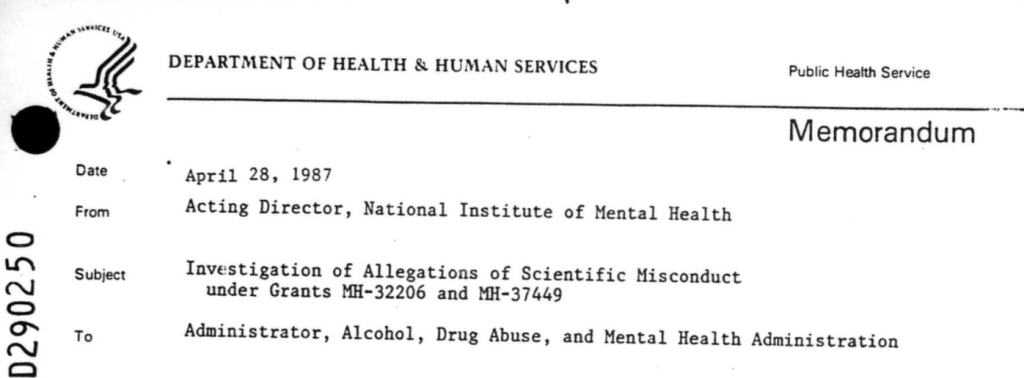
Ronald Reagan was president and James Wyngaarden was director of the National Institutes of Health when a division of the agency found 10 papers describing trials of psychiatric drugs it had funded had fake data or other serious issues.
Thirty-five years later, one of those articles has finally been retracted.
A 1987 report by the National Institute of Mental Health found that Stephen Breuning, then an assistant professor of child psychiatry at the University of Pittsburgh, had made up results in 10 papers purportedly describing research funded by two grants the institute had funded.
The recent retraction came through the efforts of psychologist Russell Warne, who unearthed the report with the help of a couple librarians, posted it on his blog, and contacted journals about its findings.
In a blog post about the report, Warne summed up the case:
In the early 1980s, Breuning was a rising star in the field of psychopharmacology for his research on the use of behavioral drugs on individuals with intellectual disabilities. By the end of the decade, Breuning would be a convicted felon and his research career would be over.
The NIMH panel found:
Stephen E. Breuning knowingly, willfully, and repeatedly engaged in misleading and deceptive practices in reporting grants MH-32206 and MH-37449; that he did not carry out the described research; and that only a few of the experimental subjects described in publications and progress reports were ever studied; and that the complex designs and rigorous methodologies reported were not employed. Dr. Breuning also misrepresented, implicitly or explicitly, the locations at which research was supposedly conducted. The Panel did not find credible Dr. Breuning’s shifting explanations as to where the various studies were carried out and his ultimate contention that many were conducted years before in the Chicago area. The Panel unanimously concludes, on the basis of all the facts, that Dr. Stephen E. Breuning has engaged in serious scientific misconduct.
Warne told us that though what happened with Breuning had been a big deal at the time, he had only heard about it recently:
I learned about the Breuning case in December 2021 when I was a peer reviewer for a manuscript (that was later published) about the effect of incentives on intelligence test performance. The authors mentioned offhand that a highly-cited meta-analysis on the topic was distorted by inclusion of Breuning’s work. I was very surprised because I had never heard of this case, even though I am well versed in the history of the field, having published articles on the topic in the past.
I looked into the Breuning case and was astonished to find that it was big news in the 1980s. Time magazine, Science, The Washington Post, Nature, the Los Angeles Times, and other major media outlets reported on Breuning’s research fraud at the time. The case was the subject of congressional hearings that later resulted in the creation of federal research integrity agencies that would become the Office of Research Integrity. And yet, it sort of disappeared from the collective memory of scientists. The more I learned, the more intrigued I became.
Indeed, neither the Office of Scientific Integrity nor the Office of Scientific Integrity Review existed in 1987. They were both created in 1989, and were then combined into the Office of Research Integrity in 1992.
In his post, Warne cataloged the scientific articles and book chapters the NIMH panel reviewed, the panel’s findings, and whether or not the papers had been retracted. Of 15 articles, the panel found 10 described research that had not happened or had other serious problems, three had bad data mixed with good, and two appeared to have no issues. All five book chapters the panel reviewed contained at least some section about Breuning’s research that the group found to be fraudulent.
Of the 10 papers with faked data, only three had been retracted, between 1986 and 1989. Warne’s next step was to contact the journals that had published the remaining papers. He told us:
In late January, I contacted the editors of five different journals and informed them of the government’s findings and told them that a retraction was needed. I made it as easy as possible for editors. I sent them a link to my first blog post about the Breuning case and another link to the government’s report and told them the page numbers where they could find information about the article(s) published in their journal. Most editors have acknowledged my correspondence, but the first retraction didn’t come for over 8 months.
I thought getting the known fraudulent articles retracted would be a slam dunk. A federal investigation already happened. The findings for the articles are clear, and I provided all information that an editor could need to retract. And yet, 8 months later, most of Breuning’s known fraudulent articles are still unretracted.
In the following month, I carefully read four of Breuning’s articles that weren’t investigated at the time (because federal funds were not used for that research). I found strong indications that all four were fake. I contacted those editors in late February and shared the information with them and told them that a retraction was needed. Three of the editors have acknowledged my message, but none have retracted their journal’s article yet. For the article used in the meta-analysis, I even found Breuning’s co-author, who agreed with me that the study never happened and that the article should be retracted. Even that hasn’t been enough to fast track that article for retraction.
The first retraction since Warne resurrected the Breuning report and started contacting journals came earlier this week. “Effects of methylphenidate on the fixed-ratio performance of mentally retarded children” originally appeared in 1983 in Pharmacology Biochemistry and Behavior, now published by Elsevier. The retraction notice acknowledged Warne’s efforts:
This article has been retracted at the request of the Editor-in-Chief based on the outcome of a report conducted by the National Institute of Mental Health (NIMH) in 1987 that was recently brought to the attention of the journal by R.T. Warne. Based on allegations of scientific fraud against Stephen Breuning, the NIMH conducted a full investigation into the alleged scientific misconducted on two grants, which funded multiple publications, one of which was this article. The NIMH report concluded that “all of these review publications relied heavily on Dr. Breuning’s own work which the Panel concluded was not carried out as reported. The publications, therefore, must be regarded as scientifically unsound and seriously misleading.” Pharmacology, Biochemistry and Behaviour are therefore retracting this article on the grounds of scientifically unsound and misleading data and conclusions.
The full NIMH investigatory report can be located here: NIMH-Breuning-Investigation-final-report.pdf (kindly provided by R.T. Warne)
We’ve reported on a few cases in which papers have been retracted decades after publication, and many years after others raised concerns. And, of course, we’ve seen journals sit on retraction decisions for years. Warne told us he thinks the retractions of Breuning’s work are taking longer than necessary:
I think that this case is a strong argument for revising COPE standards to implement timelines for issuing expressions of concern within days after credible accusations are raised and a 90-day deadline for completing investigations and issuing corrections or retractions. Lonni Besancon, Elisabeth Bik, James Heathers, and Gideon Meyerowitz-Katz suggested these timelines in an article in PLOS Biology this year. Any organization serious about the scientific integrity of the published literature should be eager to meet these deadlines. It shouldn’t take 8 months or more to issue retractions for clearly warranted, unambiguous situations like this.
The other six papers NIMH flagged remain unmarked.
Like Retraction Watch? You can make a tax-deductible contribution to support our work, follow us on Twitter, like us on Facebook, add us to your RSS reader, or subscribe to our daily digest. If you find a retraction that’s not in our database, you can let us know here. For comments or feedback, email us at [email protected].

Congrats to Prof Warne for tracking this down. Do the librarians who helped him have names? Or is this another example of “invisible labour”?
You can click through to read the acknowledgment.
Alisha Robinson
as per the linked blog:
“I appreciate the hard work from Jennifer Harbster (head of the science reference section at the Library of Congress) and Alisha Robinson (senior library assistant for interlibrary loan at Utah Valley University) for tracking down the NIMH investigatory panel’s final report and helping me digitize it. I never would have discovered most the details in this post without their help.”
It’s remarkable how similar the problems in the papers examined by Professor Warne are to previous cases such as Gueguen and Wansink. The experiments are reported in great and sometimes unnecessary detail, but with key elements missing; many people would have to be involved but are not acknowledged, let alone named; research subjects are preternaturally well-behaved, not dropping out or otherwise disrupting the experiment; and the effects are unnaturally huge. People who train their graduate students or postdocs in paper reviewing should take note: there’s a well-defined syndrome here, and if you see signs of it, you should look at the paper very critically.
I’m hoping there are real studies with similar findings. I’d rather not be spending a hundred dollars a month on medication if it’s actually a placebo.